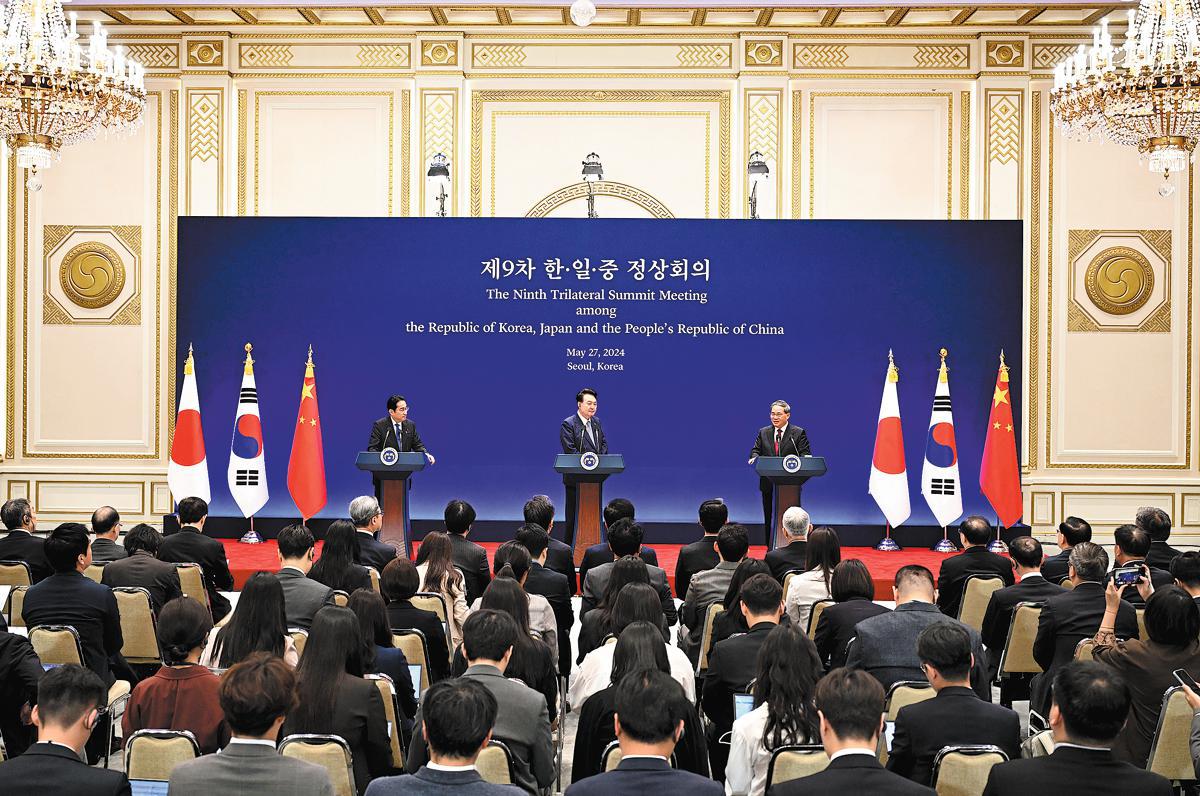
Even those trying to sow discord among the three neighbors in recent years cannot deny the fruitful outcomes of the first Trilateral Summit Meeting of China, Japan and the Republic of Korea in five years that concluded in Seoul on Monday.
Attended by Premier Li Qiang, ROK President Yoon Suk-yeol and Japanese Prime Minister Fumio Kishida, the meeting demonstrated the shared willingness of the three countries to expand common interests, if not a more mature model to get along with each other featuring more tolerance toward disputes and differences than before. The three parties issued not only a joint declaration of the meeting, but also several joint statements on their cooperation in different fields over the coming decade, and agreed to designate 2025-26 as the China-Japan-ROK Year of Cultural Exchange. In doing so, the three neighbors showed they are taking the initiative to repair their ties that have been damaged by the divisive efforts of Washington.
READ MORE: Trilateral meeting paves way for further East Asian cooperation
This year marks the 25th anniversary of their trilateral cooperation mechanism, which had stalled since December 2019. The three neighbors need to firmly stand by the shared commitment that gave birth to this mechanism of cooperation, and uphold openness, inclusiveness, mutual respect, mutual trust, mutual benefit and mutual learning. Drawing on their experiences, the three countries need to build on past achievements, and regalvanize and accelerate their trilateral cooperation. The proposals Li put forward in the meeting to deepen the trilateral cooperation are all pertinent to removing the obstacles hindering regional cooperation.
A prerequisite is that the three countries need to uphold strategic autonomy and resist external interference, so that they can respect each other's core interests and major concerns, and fully unleash the potential of trilateral cooperation. To this end, they should nurture new areas of cooperation and make their bilateral relations and trilateral cooperation mutually reinforcing. That requires the three countries to keep the industry and supply chains among them stable and unimpeded, and restart and complete negotiations on a China-Japan-ROK Free Trade Agreement as soon as possible to prevent the protectionism and geopolitical games of the United States from hijacking their agenda.
Meanwhile, the three countries should strengthen their commitment to collaborative innovation and cooperation in frontier areas. To provide a platform to synergize these endeavors, China will establish a China-Japan-ROK Innovation Cooperation Center, which will help the three countries accelerate the cultivation of new innovation drivers.
As major economies in the world — together they account for about 25 percent of global gross domestic product — the three countries are key players in the global green transition. By stepping up their exchanges and boosting their cooperation, as well as exploring and implementing more China-Japan-ROK+X Cooperation projects, the three countries can work together to advance low-carbon initiatives and address the challenges of climate change, aging societies and better respond to epidemics.
As Li said, the three countries should make good use of their respective development advantages, actively respond to the needs of the members of the Association of Southeast Asian Nations and other countries in the region, and create new engines of regional cooperation.
ALSO READ: Strategic autonomy of Seoul and Tokyo crucial for upturn in regional relations
That the leaders of the ROK and Japan said they hope that the three countries will take this trilateral summit meeting as a new starting point to deepen their cooperation across the board and jointly promote East Asian cooperation is hopefully a positive indication that they want to lessen the frictions that have developed and reduce the trust deficit that has grown between them and China.
If the goodwill displayed by the three leaders and the outcomes of their meeting can be transformed into concrete actions, projects and results, it will certainly promote more stable and amicable relations among the ROK, Japan and China than has been evinced in recent years. That will not only deliver more benefits to their people but also help stabilize the regional and global situations. But for that to happen, Seoul and Tokyo must not let Washington dictate their relations with Beijing.


